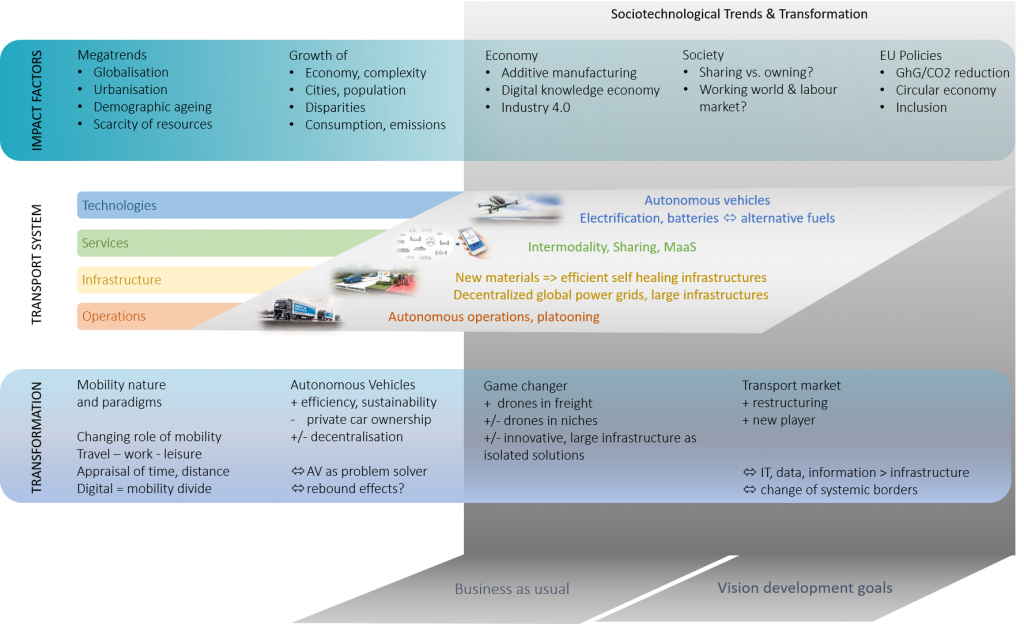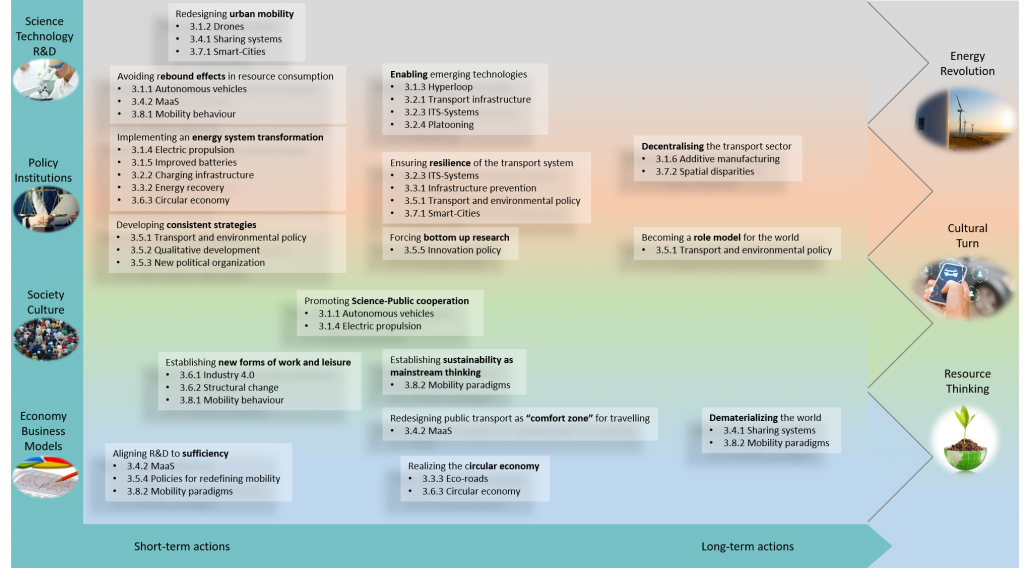The mobility system is about to change in a fundamental way. Technological innovation, political decisions and new mobility concepts as well as social and economic trends lead to a system transformation. As the future transport system will differ from today, research has to be adapted to upcoming requirements of this new system. Therefore, the overall aim of the INTEND project was to provide a new and holistic research agenda for future EU transport research.
The research approach pursued in this research project included the following main work steps and methods:
- Desk research and experts consultation on trends in mobility and transport to identify potential future game changers.
- Formulating hypotheses on the evolutionary development of the transport system and verification in an online survey with European transport-related experts.
- Developing a sketch of the future transport system.
- Elaborating a transport research agenda with guidelines and research priorities for future EU transport research.
Sketch of the future transport system
Summarizing results of the trend analysis in mobility and transport as well as the perspectives of experts on the future of mobility, we developed a sketch of the future transport system that will be fundamentally different from the current system state.

Key findings:
- Autonomous driving technologies are expected to dominate the future transport system with an implementation first in cargo/freight applications and in urban rather than in rural areas.
- Fundamental changes are expected in engine technologies by electrification of conventional drivetrains.
- IT-based solutions are expected to enable intermodality, shared mobility and MaaS services on a large-scale.
- Little potential is seen in revolutionary concepts (e.g. Hyperloop One).
- Drones are considered as a niche technology, which will rather be implemented in cargo/freight transportation than in passenger transportation.
- Adaption of regulatory frameworks for emerging technologies (e.g. autonomous vehicles) is currently missing.
- Internalisation of externalities will be crucial for a sustainable transport system.
Future transport research agenda
Based on the sketch of the future transport system as well as identified gaps and blind spots in today’s perspective on what is relevant for the future mobility system, we developed a research agenda with relevant future research fields on four dimensions with different time horizons.

Key findings:
- Potential rebound effects of technological innovations – especially with regard to emerging technologies (e.g. autonomous vehicles) and new mobility services – need to be considered and prevented.
- An energy system transformation is needed with 100% substitution of fossil through renewable energies.
- A growth-critical thinking is needed to relieve the resource system, thus recent paradigms considering growth as precondition for competitiveness and wealth need to be replaced by new and sufficient concepts.
- A cultural turn in transport system development is needed with a shift from quantity of mobility towards quality.
- To enable disruptive and innovative solutions, bottom-up research needs to be promoted (instead of top-down strategies for research).
Conclusions
- Shaping the transformation of the transport system to cope with the predicted trends and developments will be the main issue in the future.
- R&D will play a key role, as it is crucial in analysing and understanding the problems, developing solutions as well as enabling transformation.
- Funding for R&D is the political instrument of directing innovation to induce a fundamental transformation of the prevailing system.
Publications
Linkt to Deliverables, Papers and Presentations: https://intend-project.eu/publications/
Link to Whitepaper on Researchgate: https://www.researchgate.net/publication/329322189_Future_transport_research_agenda_Guidelines_for_a_forward_looking_transport_sector
Project partners

This project has received funding from the European Union‘s Horizon 2020 research and innovation programme under grant agreement No 769638.
